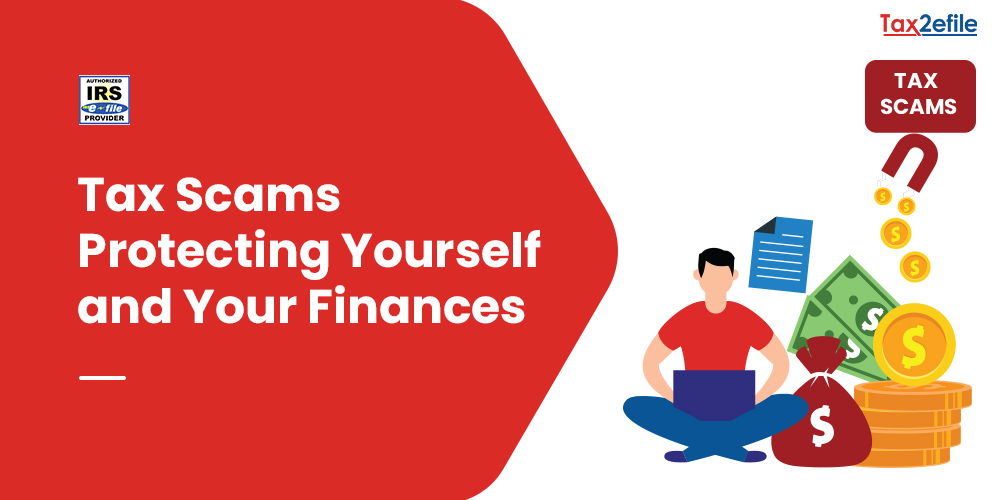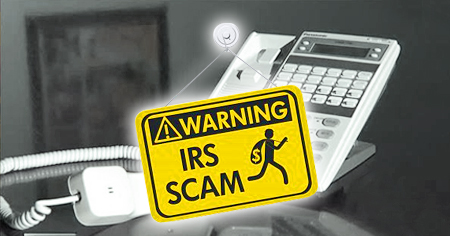- July 31, 2024

Tax season, a time of diligence for law-abiding citizens filing their paperwork, is unfortunately also a prime opportunity for criminals and fraudsters. These unscrupulous individuals, from impersonating the Internal Revenue Service to posing as CPAs, are relentless in their efforts to exploit taxpayers. They employ sophisticated social engineering tactics to steal sensitive information, fabricate tax returns, and claim refunds. Let’s delve into some of the prevalent tax scams this season and ways to fortify your finances and bank details.
Phishing Scams and Impersonation Attempts
The scammers will send phishing emails and other messages to taxpayers, claiming to be from the IRS or other genuine agencies. The statements in these emails would entice victims into schemes by offering them a tax rebate or scaring them with phony tax fraud allegations. They might also send alarming text messages stating that the taxpayer’s account has been placed on hold or has been reported for unusual activity and send bogus links as solutions, claiming to restore the taxpayer’s account.
The IRS urges taxpayers not to click on unsolicited links pretending to be received by the IRS, as they may include ransomware or malware that stops them from accessing their tax information. Tax scams in 2024 could potentially include impersonation attempts, in which the taxpayer’s personal information is obtained in order to file a bogus return or perform other financial crimes. The IRS needs taxpayers to provide some personal information to verify their identity, such as their residence, SSN, and so on. There have been several data breaches in recent years in which criminals gained access to a warehouse of personal information.
The IRS warns its taxpayers to be cautious of any communication, requesting that they reply with personal information to verify the personal information through suspicious links. They should not click on these links. The IRS does not communicate with its taxpayers through email but through the United States Postal Service.
Fraudulent Tax Preparers and Bogus Refunds
Many tax preparers claim to be professional and honest in their services but could turn out to be fraudulent tax preparers who could change your tax returns after you have approved and signed them. They might alter the income and tax credits in order to obtain a bigger refund and retain some of them for themselves. In some instances, the tax preparer might steal the entire refund of their client by changing the information of the direct deposit accounts.
Yet another common tax fraud situation is when the tax preparer files the tax return without the authorization of their clients or makes changes in the tax return without their knowledge. They might also use the past information to prepare the tax return for the current year. IRS warns taxpayers to be aware of these fraudulent tax preparers and gives some tips to identify them. Fraudulent tax preparers are those,
- Who will not sign the tax returns as the paid preparer
- Who promises too good-to-be-true refunds
- Preparers who do not have an established business
- Who report return credits and deductions that the common man doesn’t understand.
Legitimate tax preparers will be equipped with transparent taxing practices and verifiable credentials. They will have a verifiable PTIN ( Preparer Tax Identification Number) which is issued by the IRS. This number is the legal identification of the tax preparer, which he uses for tax filing purposes. This is in fact the first thing that the taxpayers should ask for before hiring them. Also, genuine tax preparers will have additional qualifications, such as being a Certified Public Accountant, Enrolled Agent, or Attorneys specializing in taxing law.
Identity Theft and Tax Scams
Tax-related identity theft represents the event when someone steals the personal information of the taxpayer to commit tax fraud. There are chances for the taxes to get affected if the SSN is used to file a fraudulent return or to claim a tax credit or refund. Victims of tax-related identity theft may be unaware that it has occurred until they submit their taxes and learn that a return has already been filed under their Social Security number. The IRS may also send you a letter if it discovers a suspicious tax return using your Social Security number. Warning flags of tax-related identity theft are,

- Multiple tax returns are submitted using your Social Security number.
- You are alerted that you owe additional taxes, have had your tax refund reduced to cover debts, or had collection action taken against you for a year you did not file a tax return.
- IRS records show you received pay from an employer you did not work for.
The Importance of Electronic Filing To Avoid Tax Scams
Because of persistent tax scams and tax fraudster activities, the IRS recommends that its taxpayers file their returns electronically. This helps them avoid interest scams and offers a host of other benefits. E-filing has enhanced flexibility in tax filing and is much more convenient because one’s taxes may now be filed from the comfort of their own home or workspace at their leisure.
E-filing saves a great deal of time and money. When taxes are E-filed, whether for corporations, professions, or individuals, the information is directly delivered online from the e-filer’s servers to the tax agency’s servers. The technique saves the agency time and money by shifting data from paper to online input, as well as reducing transmission errors.
E-filing also saves time and effort for both the tax agency and the taxpayer because E-file tax returns are often considerably quicker and faster to process than paper returns, saving both parties a significant amount of time. Since there are chances of eliminating transmission errors through electronic filing, it results in extensive data record accuracy and maintains the secrecy of the overall tax filing process as well.
E-filing increases the availability and interconnection of online data, and it makes linking or tracking data back to a tax-paying unit much easier and faster. E-filing has also strengthened the validity of the tax filing process, as well as accountability for both the tax agency and the individual. Paper filing is slightly more unclear due to the high degree of uncertainty surrounding the receipt of tax papers and records.
E-filing provides notice throughout the tax filing process, as well as confirmation of receipt or rejection, within 24 hours, boosting the overall level of assurance. It reduces ambiguity compared to the paper filing technique.
Stay Informed and Report Suspicious Activity
To prevent becoming a victim of a scam, you must be vigilant throughout tax season. You may protect yourself from potential financial and legal troubles by learning how to identify legitimate tax services, identifying the warning indicators of unscrupulous preparers, and knowing what steps to take if you face a scam. Remember that when it comes to tax preparation, transparency, credentials, and a proven track record are your best allies. It is important to stay informed, remain cautious, and make your tax filing procedure as secure as possible.
If you suspect you are a victim of identity theft, continue to pay your taxes and file your returns, even if you have to do so on paper rather than online. After you get the suspicion, respond quickly to any IRS letter by calling the number given. If your electronically submitted tax return is denied due to a duplicate filing with your Social Security number, or if you are asked to do so, fill out an IRS Identity Theft Affidavit. There are two options for doing this: print the form and mail it to the IRS or submit it online at www.identitytheft.gov. The IRS will write you a letter within 30 days verifying receipt of the affidavit. Other best practices to follow, to safely file the tax returns are as follows.

- Use reliable tax filing software or look for well-established tax preparation businesses with positive reviews and strong reputations.
- When looking for tax help, choose professionals that have been suggested by reliable sources.
- Make sure they are willing to sign the tax returns they create, as required by law.
- Filing taxes electronically and receiving refunds via direct deposit can help to lessen the risk of postal fraud.
- To avoid data theft, always transmit critical information online using secure, private internet connections.
Additional Tips for Avoiding Tax Scams
The IRS suggests the following procedures to help protect yourself from tax-related or other identity theft tactics,
- Always utilize security software, such as firewalls and antivirus protection, and keep strong passwords.
- Educate yourself on how to recognize and prevent phishing emails, threatening phone calls, and text messages from crooks posing as organizations like your bank, credit card company, or the IRS.
- The IRS will not contact you via email, text message, or social media message. If you get an email claiming to be from the IRS, forward it to phishing@irs.gov.
- If you are unsure, do not answer, instead, contact the company directly to confirm whether the message is authentic.
- Avoid clicking links or downloading attachments from unknown or questionable communications.
Taxpayers can rely on IRS-authorized tax filing service providers like Tax2efile, to avoid falling prey to such taxing scams. They help in quick, safe, and secure filing of taxes directly at the IRS website and the taxpayer can also get the stamped Schedule 1 copy from the IRS within minutes. Instead of believing fraudsters for the lucrative benefits, it is better to avail services from authorized professionals for the larger good.

